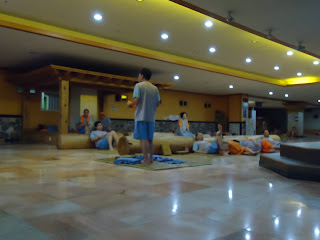The imagined order shapes our desires
Most people do not wish to accept that the order governing their lives is imaginary, but in fact every person is born into a pre-existing imagined order, and his or her desires are shaped from birth by its dominant myths. Our personal desires thereby become the imagined order’s most important defences.
For
instance, the most cherished desires of present-day Westerners are shaped by
romantic, nationalist, capitalist and humanist myths that have been around for
centuries (...).
Romanticism tells us that in order to make the most of our human potential we
must have as many different experiences as we can. We must open ourselves to a
wide spectrum of emotion; we must sample various kinds of relationships; we
must try different cuisines; we must learn to appreciate different styles of
music. One of the best ways to do all that is to break free from our daily
routine, leave behind our familiar setting, and go travelling in distant lands,
where we can “experience” the culture, the smells, the tastes and the norms of
other people. We hear again and again the romantic myths about “how a new
experience opened my eyes and changed my life”.
Consumerism
tells us that in order to be happy we must consume as many products and
services as possible. If we feel that something is missing or not quite right,
then we probably need to buy a product (a car, new clothes, organic food) or a
service (housekeeping, relationship therapy, yoga classes). Every television
commercial is another little legend about how consuming some product or service
will make life better.
Romanticism,
which encourages variety, meshes perfectly with consumerism. Their marriage has
given birth to the infinite “market of experiences”, on which the modern tourism
industry is founded. The tourism industry does not sell flight tickets and
hotel bedrooms. It sells experience. Paris is not a city, nor India a country –they
are both experiences, the consumption of which is supposed to widen our
horizons, fulfil our human potential, and make us happier. Consequently, when
the relationship between a millionaire and his wife is going through a rocky
patch, he takes her on an expensive trip to Paris. The trip is not a reflection
of some independent desire, but rather of an ardent belief in the myths of
romantic consumerism. A wealthy man in ancient Egypt would never have dreamed
of solving a relationship crisis by taking his wife on holiday to Babylon.
Instead, he might have built for her the sumptuous tomb she had always wanted.
Like the
elite of ancient Egypt, most people in most cultures dedicate their lives to
building pyramids. Only the names, shapes and sizes of theses pyramids change
from one culture to the other. They may take the form, for example, of a
suburban cottage, with a swimming pool and an evergreen lawn, or a gleaming
penthouse with an enviable view. Few question the myths that cause us to desire
the pyramid in the first place.
Sapiens, A brief History of Humanking.
Yuval Noah Harari.






Comentarios
Publicar un comentario